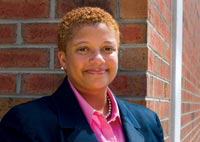A year ago, Asheville faced a budget shortfall that had Council members and city staff scrambling. What a difference a year makes.

For the 2007-08 fiscal year, which begins July 1, City Council has the happy task of deciding how to spend at least $2 million in surplus revenues. That was the word from Chief Financial Officer Ben Durant during the year’s first budget workshop, held just before Council’s April 17 meeting. Durant credited several factors with helping create the surplus: The city spent less than was originally budgeted, the city’s tax base grew two percentage points more than was projected, and fewer property owners than expected appealed the recent property revaluations. A first draft of the new budget is expected in early May, noted City Manager Gary Jackson.
But deciding how to spend the extra money may prove to be almost as contentious as last year’s hard choices on what to cut and what taxes or fees to raise to balance the budget.
With several key city staffers in the audience, Durant proposed earmarking the extra funds for capital improvements. Council members seemed fine with that approach for at least a portion of the extra money, though they disagreed on the particulars. And in any case, the discussion soon shifted from capital-project priorities to law enforcement, pitting Council member Carl Mumpower against several of his colleagues.
Citing Police Chief William Hogan‘s recent proposal that the city spend an extra $2.4 million cracking down on drug dealing, Mumpower stood firm in his conviction that eradicating drug trafficking ought to be the city’s No. 1 priority. “I think this is the year to do that,” he said, though he also asked Hogan if the cost could be trimmed, and Hogan agreed to take a look.
Many Council members voiced support for going after the city’s drug trade—but not at the expense of the top budget priorities that a Council majority had identified during their recent retreat: sidewalks/greenways, energy/environment, public transit, tax relief and affordable housing.
Mumpower reminded his colleagues that they’d recently agreed to confront the city’s drug problem. In January, Council directed Hogan to propose a plan for eradicating open-air drug markets in the city. But Council members also instructed City Manager Gary Jackson to come up with long-term strategies for creating job opportunities and reducing poverty to help reduce the drug trade.
Council member Robin Cape and Mayor Terry Bellamy deemed it unwise for the city to use all of the anticipated windfall going after drug dealers while ignoring other law-enforcement issues, such as prostitution and downtown crime.
But Mumpower retorted that drugs are behind those other issues. “If you look at those prostitutes, they’re prostitutes because of the drug market,” he said. “I think we share the passion [to eradicate drugs], but in terms of limited resources … and by not specifically targeting drugs, I think we’re missing the boat.”
That didn’t sit well with Cape, who told Mumpower: “Your personal agenda has gone over the top. We can arrest people all day long, but that’s only part of the picture.”
“You’re correct—I am at war with the drug culture,” Mumpower shot back, adding that he has no plans whatsoever to back down.
Bridging the achievement gap

Council members struck a decidedly more civil tone during their regular meeting, as they interviewed five candidates for two vacant school board seats.
After a 20-minute session with each candidate and two rounds of voting, Council appointed Jacquelyn Hallum and Precious Folston to replace Dolly Jenkins-Mullen and Ann Van Brock, who have completed their four-year terms. Hallum is director of health careers and diversity management at the Mountain Area Health Education Center; Folston is a community-support technician at Universal Mental Health. They’ll be sworn in April 30. The other candidates were former school board member John Legerton, William Todd Weatherly and Brian Sarzynski.
The women, both African-American, said they are proud products of the city’s school system. And while Hallum cited her desire to expose more black and other minority students to jobs in the area’s booming health-care industry, Folston spoke of igniting a passion for learning and success among all students but particularly African-Americans, whose overall achievement in middle and high school lags behind that of their white peers.
A major line of questioning concerned how the Asheville City Schools should address the high dropout rate among black males, which Mumpower said now stands at 70 percent, and what the city might do to help narrow the achievement gaps among some minority students.
“I think everything starts in the home,” Folston told Mumpower, who cast his vote for her and declined to support anyone else as an alternate. Folston also pointed to a lack of leadership and black-male role models in the community. The community, she said, must try to identify the issues that keep blacks and other minorities from achieving—and identify successes that can be built on.
“We have to realize that not all kids can go to college,” said Folston, a West Asheville resident with two children, adding that not all well-paying jobs require a college degree. Some students, she noted, may not know what options exist and how to take advantage of them. If more students understood what they have to do to achieve some level of success, they might not be as quick to drop out or neglect their studies, she argued.
“We have to determine how to introduce jobs [and vocational tracks] to students who won’t go to college,” said Folston. “We have to introduce employment in a whole new way.” One way to do that, she said, would be to identify at-risk students and find them mentors who could inspire them, using “successful minorities to teach, train, motivate and pull out greatness on a consistent basis,” said Folston.
Hallum, too, emphasized the importance of providing positive examples, telling Council members, “Internships, shadowing and mentoring long-term is important,” she said. “A field trip is not enough. Students need to be taught that grades aren’t important—education is important.”
Throughout the interview process, Mumpower repeatedly pointed out that Asheville is among the few localities that still appoint school board members. He asked Mayor Bellamy to place the matter on the agenda for a future meeting so Council could debate the merits of electing school board members, which he said would provide full accountability.
Other business
Conditional rezoning of a property on Dogwood Road was approved on a 5-2 vote. The zoning was changed from single-family to residential-multifamily to allow construction of the 124-unit Vistas of Westfield development. Newman and Freeborn said they couldn’t support the project because a portion of it would be built in a floodplain. Although city staff didn’t think the problem would be severe, neither they nor the developer’s engineer could provide adequate assurances that the project wouldn’t worsen downstream flooding in an area that’s ripe for future development. The property is just outside the city limits but within the city’s zoning jurisdiction.
In another matter, Council members unanimously approved a conditional-use permit for phase two of Westmont Commons on Chamberlain Drive in Leicester; the project calls for building 72 apartment units.



So, the city has a $2 million dollar surplus, which is a good thing. But why not use this extra money for needed repairs on the Civic Center, or the multitude of other needs the city has?
Instead Councilman Newman has proposed an $80 per family refund. Dumb idea. But Newman is up for reelection this year. Coincidence? I think not.